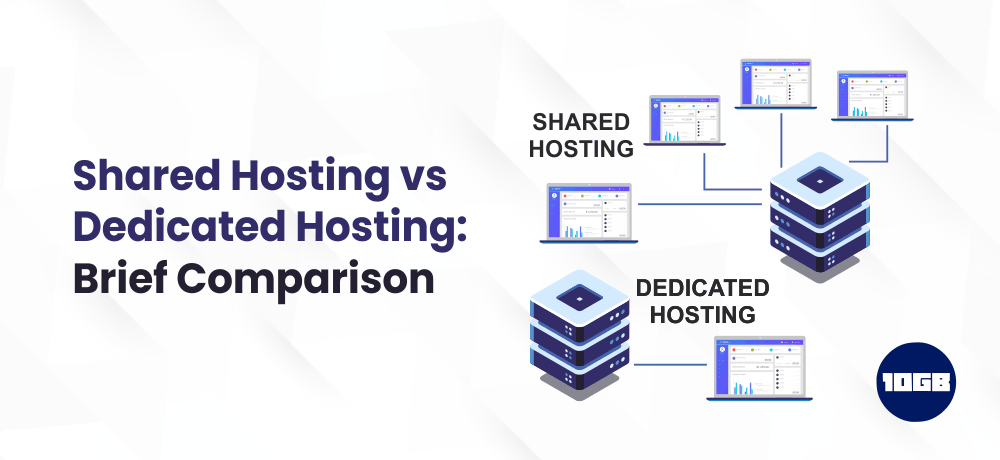In the web hosting world, you have to choose from either server dedicated to your personal use or a shared use of a server (shared server). Deciding on Shared Hosting Vs Dedicated Hosting is confusing as there are several factors involved while choosing among both Shared Hosting Vs Dedicated Hosting.
Short Briefing of Shared and Dedicated Servers
Here’s a short briefing of two hosting models (Shared Hosting and Dedicated Hosting):
With a Dedicated Server, you will have the whole server for your individual use and full root access. And so, you need to decide how to handle, manage and maintain it. there will be no noisy neighbors that will be sharing the server resources as it’s just your applications operating on the webserver.
Whereas on the other hand; On a Shared Server there will be several websites and applications along with yours on the same server. Hence, you don’t have root access to the server and operations unless and until you have a hosting provider who gives tweaking abilities.
So, while comparing Shared Hosting Vs Dedicated Hosting, understand that shared servers always imply limitations. But, shared machines can likewise be more cost-efficient.
Suggested For Further Reading:
- What is Shared Hosting and How it Works?
- What is a Dedicated Server? Benefits of Dedicated Server Hosting
Management & Configuration – Shared Hosting Vs Dedicated Hosting?
Dedicated Hosting Offers Complete Control
One of the primary points for picking a hosting type is its control. And, while the machine is dedicated, it is totally exclusive to your web apps. Therefore, as a result, you have comprehensive configuration and maintenance control over the server. So you can set different parameters, such as server power usage and distribution, and the HDD space open to an application.
If you want to host an application that requires highly-customized server configurations, then a Premium Dedicated Server UK is the sole option. As it is just the way you will obtain root access that lets you modify server variables end-to-end.
On the other hand, dedicated servers do imply that you’re liable for all upkeep and smooth-running of the machine. This incorporates installing the patches and running updates when it is important.
But, dedicated server resellers can give a helping hand by granting full management of all dedicated server requirements. Additionally, there are also middle tiers of management, including semi-managed servers where the host does some part of the work for you. The host-manager options make the shared hosting vs dedicated hosting decision a bit easier unless you are interested in doing server management by yourself.
Shared Hosting Doesn’t Offer The Same Scalibiility
Of course, you can increase few specific elements of your shared-use server, including HDD space and the size of individual databases. You additionally receive an infinite number of email accounts whereas a few web hosting providers will likewise offer unmetered internet. However, any shared server vs dedicated server comparison will immediately point out the scaling restrictions of shared hosting.
You can’t upgrade the CPU power of a shared hosting solution and you won’t be able to scale the amount of RAM. For advanced applications, this would quickly create problems. But simple websites should cope well with shared hosting solutions. Just stay away from cheap shared hosting solutions that pool hundreds of thousands of websites on a single machine.
Server Performance
On a dedicated server, managing performance is a lot more manageable. Yet again – it goes back to control. Because you can control how much CPU resources you allot and you can determine whether you should go for SSD drives over HDD drives. You also have the freedom to pick OS on an exclusive-use machine, no matter if it is Windows or Linux distributions like CentOS or Debian.
Sadly, with shared-use hosting, the controls are limited. Certainly, your hosting provider can guarantee 99.9% uptime, however, no web host will let you use an unlimited amount of resources. At some point, you will hit a performance cap and your website will go down. Always ask what workload a shared-use hosting account can cope with before you sign up, particularly if you are running a website with high traffic.
Shared Hosting vs Dedicated Hosting – Pros & Cons
Here is when you should pick shared hosting over dedicated hosting:
- You require an affordable, beginner-friendly solution
- Fast and easy setup is essential
- You need to bypass hardware maintenance
- Tools for simple site-building is essential
- Want pocket-friendly hosting and don’t have many demands
Avoid shared hosting if:
- You want a total, server-level control
- Site uptime important factor
- Your application will use a myriad of bandwidth
Buy a dedicated hosting solution if:
- Complete control of server resources and setup is crucial
- You require root-level access to a server
- You are hosting a growing app that requires scalability
- Security is of utmost importance
- Managed hosting support is vital
Don’t buy dedicated hosting if:
- Expenses are a principal factor
- You can’t handle and manage a machine and can’t afford managed services
- You have no in-house IT staff
Conclusion
Picking the ideal hosting solution won’t be easy. But, we have sketched the pros and cons of Shared Hosting vs Dedicated Hosting in expectations of interpreting your choice. Nevertheless, you should always discuss with your hosting provider if you are still uncertain.
If you are tight on budget but need the functionalities of a dedicated server? Kindly check out our Managed VPS UK plan
